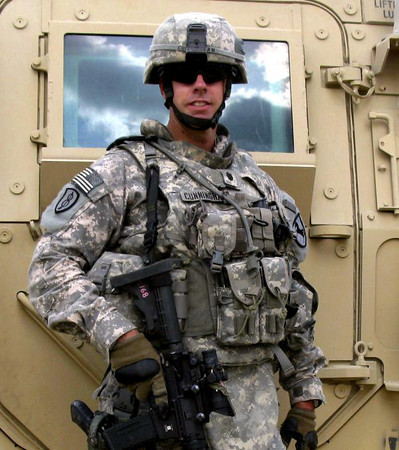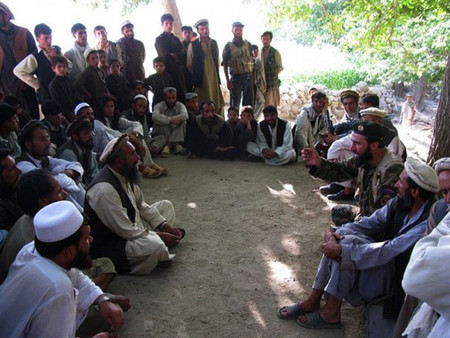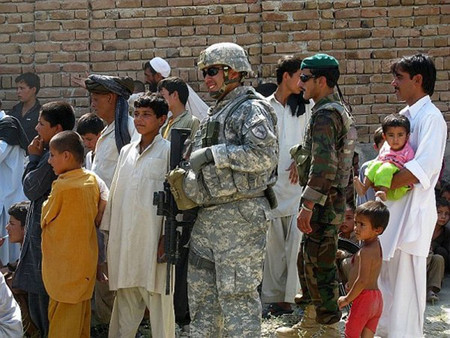Nevada National Guard’s Wildhorse Squadron does its best to help Afghans cast ballots
Editor's note: This is the second in a collection of periodic essays from Afghanistan by Lt. Col. Scott Cunningham, commander of the 1st Squadron, 221st Cavalry, the largest overseas deployment of Nevada National Guard troops.
AUG. 25
There are more stars than can be counted as you stare into the sky in the cool air of the mountainous Dowlat Shah district. The lack of smog, haze, pollution, or any light from human sources allows you to see the sky as it really is: dark blue and vastly speckled with points of light.
This, and the opportunity to operate in the cooler, scenic mountain valleys of places like Dowlat Shah are some of the welcomed perks encountered during the pre-election security operations conducted by soldiers of the Wildhorse Squadron of Nevada's 1st Squadron, 221st Cavalry.
The Afghan elections on Aug. 20 have been the centerpiece of the squadron's operations and efforts for the past month. Our goal was ensuring that conditions were such that the people of Afghanistan had the opportunity to choose their next leader. This required a major effort, not only from the squadron's soldiers, but from our Afghan partners as well: the police, army, and government.
Elections are still something of a novelty to Afghans. This is only the second free election in the country's history; and making sure they are conducted in a free, fair, and impartial manner was a major challenge. Also, there are elements that see the election as a threat and will stop at little to prevent or disrupt them. The Taliban and other extremist Islamic groups -- as well as anyone with a dispute with the current government -- would like to see the elections derailed in any way possible.
If the election is carried off as planned, the government, its systems and, most importantly, its legitimacy are reinforced.
The squadron's plan was to help the Afghan security forces and make it clear to the people it was safe to vote. This was accomplished through numerous patrols, polling site support, and a series of large security operations throughout our region. Each of these larger security operations was a multiday affair. It involved moving US and Afghan security forces into a threatened or influential area, conducting numerous patrols and meeting with townspeople and local residents, and it culminated with a major "shura," or meeting of elders.
The shura is the cornerstone of Afghan politics. It's an opportunity to pass along information and ideas, come to consensus, resolve disputes, and agree on plans. Traditional tribal leaders wield immense power and influence, and the speed and effectiveness in which they can carry out their plans and disseminate information is remarkable.
These pre-election shuras are quite effective. Participants demonstrated an awareness of key local issues, allowed controversial topics to be discussed and resolved, and received guarantees of security and support from the leaders of villages where polling would be conducted. This was crucial in a land where a man's word and his honor count for more than anything of material value.
The shuras also had a major impact on negating the Taliban propaganda campaign. The Taliban claimed the elections were illegitimate, and un-Islamic. The Afghan government countered that with a simple, but powerful message: "The Koran demands that Muslims choose their own leaders. The Afghan constitution allows this through the process of elections. Since the Afghan constitution is an Islamic constitution, the elections are sanctioned by Islam, and it is your duty to vote."
This is the message reinforced at each shura. In a nation with 20 percent literacy, little access to TV, and intermittent radio reception, word of mouth is still the main conduit for information.
For the elections themselves, the Afghans had the lead role. They set up polling sites and delivered ballots (sometimes by helicopter or donkey). They ran election day activities and transported ballots safely back to collection points. We advised, supervised and supported when necessary, but for the most part it was their operation.
As election day approached, the soldiers made all the necessary preparations. Operations orders, reconnaissance missions, synchronization meetings with our Afghan counterparts all had to be done. By election day, the squadron was set, with key leaders stationed at all the critical command posts, and Quick Reaction Forces positioned throughout the sector to rush into action in the event of trouble.
Although the Taliban had threatened massive attacks, mayhem and disruption, all reported eagerly by the various media, reality was somewhat different. As promised, there were numerous attacks, but all were beaten back with little difficulty.
Rockets and mortars were being fired ineffectively at our combat outpost at Nagil. Our return fire was a bit more effective. Also, polling places and Afghan security forces came under attack in a few locations. The Afghan security forces responded quickly and effectively, and where possible the Wildhorse Troopers moved to their aid.
Throughout the day, the insurgents tried to disrupt the elections and cause problems. Because of the efforts of the Afghan army, police, and with the help of the squadron's soldiers, their efforts were a dismal failure.
In no way were the elections disrupted; nor were any voters hurt or injured during the polling. Security was a major success for the government.
While the security of the elections was a success, the elections themselves were not flawless. Voter turnout was less than hoped. This election was not as exciting as the first, and typical voter apathy did creep in. Some mullahs preached against the entire process. Also, some took the Taliban threats to heart and avoided casting a vote.
Still, considering the challenge they faced, we were very proud of our partners in the Afghan government. A major goal of the coalition forces is to support the legitimacy of the Afghan government, as well as increase its capacity to govern.
In this election, they showed they were capable of planning and carrying out a complex and time-sensitive operation in a threatened security situation. It was a major success.
Such is an election in a war-torn nation. An infant democracy painfully learning the process of free choice, campaigning, voting, and exercising their new right to choose their own leaders and their own path into the future.
Video & slideshow of firefight in Afghanistan
























